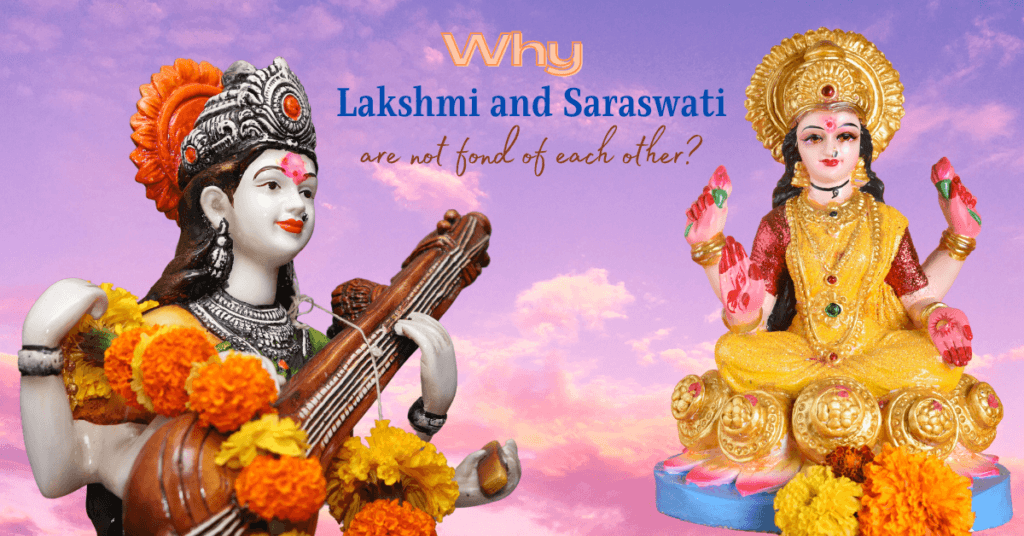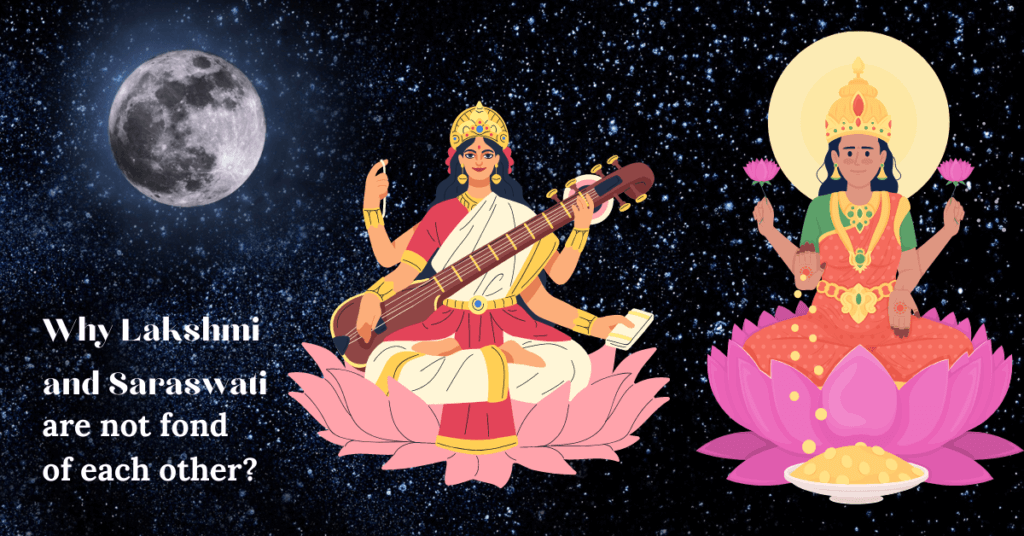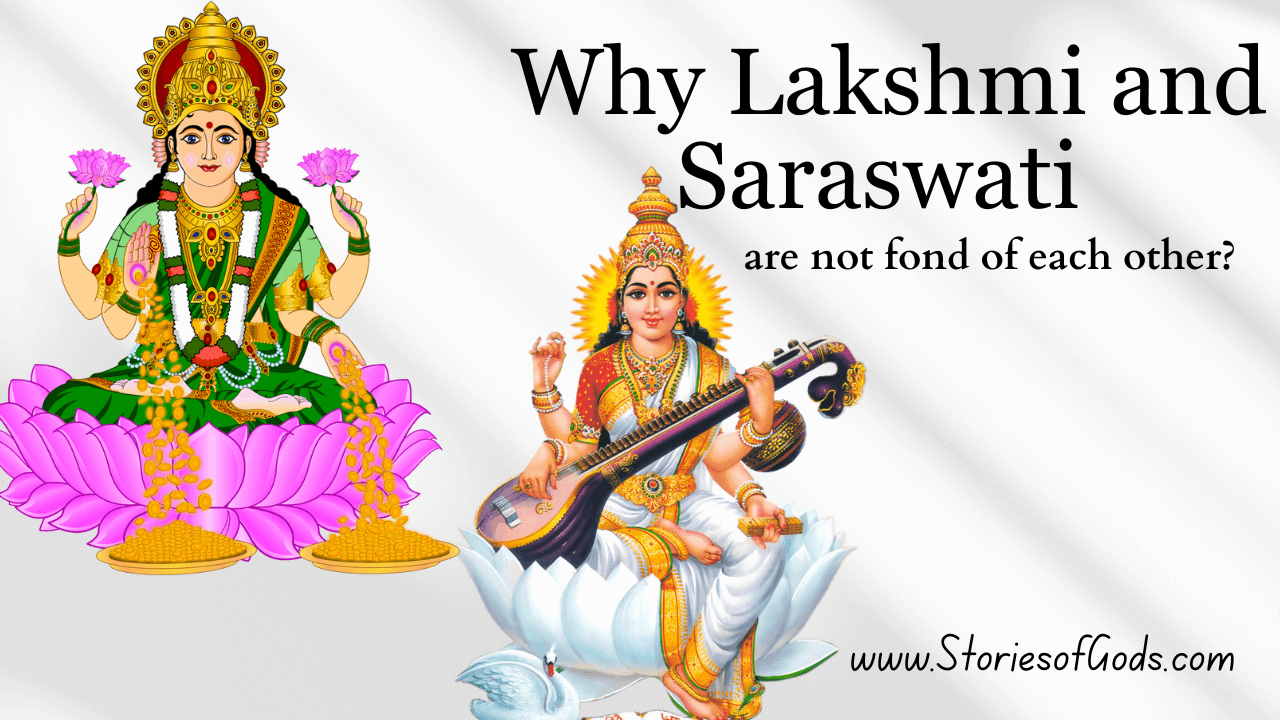Is Lakshmi jealous of Saraswati?
Why Lakshmi and Saraswati are not fond of each other? The goddess Lakshmi is worshipped as the god of wealth and prosperity in Hinduism.
Lakshmi is revered for more than just worldly wealth; she is also seen as the goddess of freedom and spiritual richness. This article will examine the various facets of the intricate and diverse Lakshmi symbolism.
Lakshmi is portrayed as a stunning female with four arms, donning a red dress with a golden border, and either seated or standing on a lotus.
Her four arms stand in for the four axes of space, signifying her omnipotence and omnipresence. Her dress’s crimson hue denotes energy, and its golden border denotes affluence.
Why Lakshmi and Saraswati are not fond of each other?

What is the relationship between Saraswati and Lakshmi?
Lakshmi’s four hands stand in for the four main objectives of human life: Dharma (goodness), Kama (sincere desire), Artha (wealth), and Moksha (freedom from birth and death).
Her back hands stand for spiritual pursuits that lead to spiritual perfection, while her front hands stand for worldly pursuits.
The lotus on Lakshmi’s back right hand represents the idea that one should carry out all of their worldly obligations in line with Dharma. She holds a lotus in her rear left hand, signifying freedom from rebirth and death.
The dropping of golden coins by Lakshmi’s front left hand represents her function as the giver of money and prosperity to her devotees. She bestows blessings on her devotees with her front right hand.
Standing next to Lakshmi are two elephants that stand for the name and fame that come with material wealth.
The genuine Lakshmi devotee, however, aspires to share money and prosperity with others in order to bring happiness to others rather than seeking it for personal gain.
Lakshmi’s lotus seat, on which she stands or sits, represents the ability to enjoy the riches of the world without become dependent on them. The lotus is a representation of innocence, enlightenment, and separation from the physical world.
Why Lakshmi and Saraswati are not fond of each other?
An owl, a strange and solitary bird that can see well at night, is Lakshmi’s carrier. This represents Lakshmi’s capacity to see into the spiritual realm in addition to the material world.
To welcome Lakshmi’s carrier, the owl, inside the house on the auspicious occasion of Diwali, the main door of the house is left open and a light is left on.

What do they say, scholars are rarely wealthy?
Lakshmi’s lotus seat, on which she stands or sits, represents the ability to enjoy the riches of the world without become dependent on them. The lotus is a representation of innocence, enlightenment, and separation from the physical world.
Why Lakshmi and Saraswati are not fond of each other?
According to Hindu mythology, Lakshmi is the spouse of Lord Vishnu, who is revered as the universe’s protector. Lakshmi and Vishnu are seen together in a variety of manifestations and are revered as a celestial couple.
As the wife of Lord Brahma and the goddess of knowledge and the arts, Saraswati. Lakshmi is also regarded as her sibling. But according to Hindu mythology, Lakshmi and Saraswati never developed a friendly relationship.
As knowledge and riches don’t go hand in hand. It it is for this reason that it is claimed that a scholar is rarely wealthy.
Lakshmi’s lotus seat on which she stands or sits. It represents the ability to enjoy the riches of the world without become dependent on them. The lotus is a representation of innocence, enlightenment, and separation from the physical world.
Why Lakshmi and Saraswati are not fond of each other?
During the Diwali festival, also known as the festival of lights, Lakshmi is worshipped. Lakshmi is said to visit people’s homes on the night of Diwali and bestow money and prosperity.
In India and other places where there are Hindus, the holiday is observed with great fervour and devotion.
The significance of female goddesses in Hindu culture and religion is substantial. The goddesses are honoured as the universe’s creators and keepers. The idea of a divine feminine is given paramount prominence. This is because these deities’ male counterparts are perceived as being less active in the world.
Hinduism places a significant value on the worship of the goddesses, as seen by concepts like Adi-Mata and Durga.






